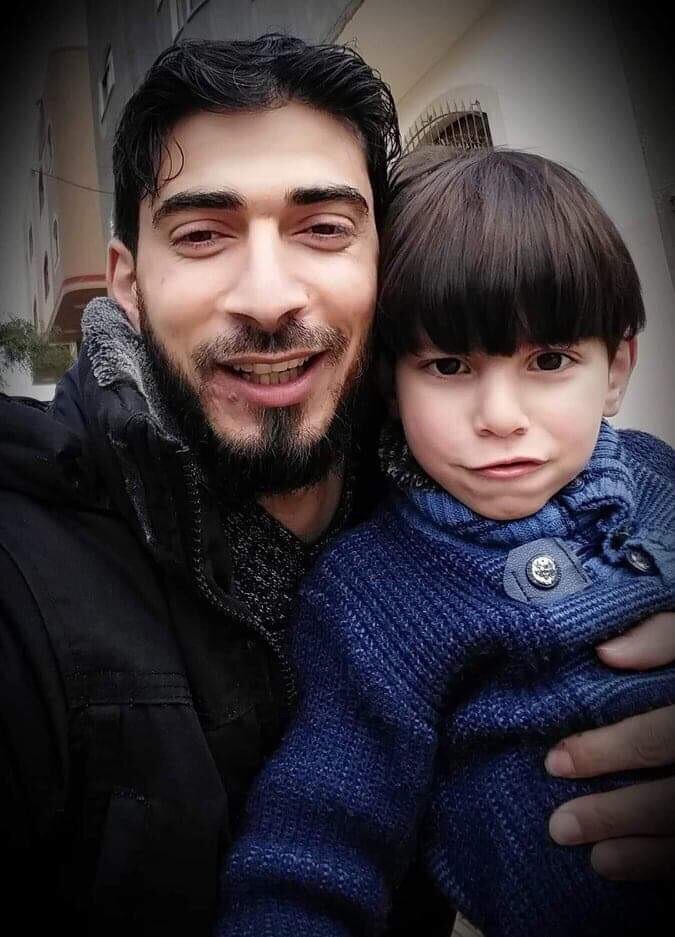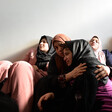The Electronic Intifada 13 December 2019

Ibrahim Dabous, pictured with his nephew. (Photo courtesy of family)
It was about a year ago. I was introduced to him by my cousin Muhammad Ashour, an interior decorator.
Ibrahim was reticent. It wasn’t until his second day working in my home that I heard him speak.
Despite how quiet he was, Ibrahim could be very funny. When he cracked a joke, everyone in the room would laugh.
It took Ibrahim and my cousin approximately a week to paint my home. During their last day doing that job, we had a conversation about Israel’s major offensive against Gaza in the summer of 2014.
I was taken aback when Ibrahim told me that Israel had destroyed his newly built home that summer.
He was taken aback when I told him that – since the second intifada broke out in September 2000 – Israel had killed 31 of my friends.
“I might be number 32,” he said.
The comment should not have been amusing but the way Ibrahim delivered it was. And I couldn’t stop myself from giggling.
That was typical of Ibrahim. His sense of humor was dark.
“So many dreams”
Tragically, his comment turned out to be prescient.
On the morning of 12 November, I learned that Ibrahim was among the Islamic Jihad fighters who had been attacked by Israel.
I phoned my fellow journalist Yousif Fares; he is married to Ibrahim’s sister. Yousif informed me that Ibrahim was seriously wounded.
Around five hours later, Ibrahim died.
It is painful to know that Ibrahim has indeed become number 32 on my list of friends killed by Israel. But I realize that others in Gaza have suffered much worse than me lately.
Ibrahim’s wife Marwa is one of them; the couple had wed a mere two months earlier.
“I never expected that Ibrahim would leave us so quickly,” Marwa said. “We had so many dreams that we wanted to make come true – together.”
The 12 November attack began with the assassination of Baha Abu al-Ata, an Islamic Jihad commander.
Predictably, Israel depicted him as a “terrorist” and – for the most part – the Western media reported Israel’s version of events uncritically. Little attention was paid to how his wife Asma died in the attack and to how the couple’s five children suddenly became orphans.
Liyan Abu al-Ata, the youngest of the five, had just turned 11.
“We didn’t see our father a lot at home,” Liyan told me. “He came to see me on my birthday as a surprise. I went to bed happy. I was waiting for the morning to celebrate my birthday with my father.”
“A kiss for the last time”
Liyan was asleep when Israel attacked her home. So were her siblings – Salim, 19, Muhammad, 18, Ismail, 15, and Fatma, 14.
All of them were injured.
“Israel has taken away my happiness,” said Liyan. “Israel has deprived me of love from my dad and mom.”
Israel killed approximately 35 people in Gaza over a 48-hour period last month.
Nineteen of those killed were resistance fighters; the remainder were civilians.
The fighters included Khalid Faraj, a resident of Nuseirat refugee camp in central Gaza. He has been named as an Islamic Jihad commander.
Faraj was killed when Israel attacked al-Mughraqa, southwest of Gaza City.
There was a marked difference between how news of his death was received by Palestinians and how it was reported in the Western press.
While mainstream media stories simply drew attention to his political affiliation – as if that explained everything – many Palestinians expressed empathy with Faraj’s family.
One photograph widely shared by people in Gaza showed Khalid’s 13-year-old daughter Sama crying over his body at his funeral.
“Before my dad left in the morning, I made him a cup of tea,” said Sama. “He drank it quickly, kissed my head and left. Two hours later, he was brought back to us dead. I gave him a kiss for the last time.”
Hamza Abu Eltarabesh is a journalist from Gaza.





